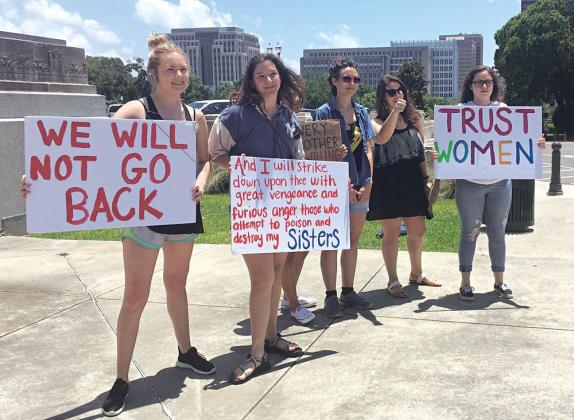
Lauren Heffker and Hunter Lovell / LSU Manship School News Service
Abortion continues to top the legislative agenda this week as Louisiana lawmakers in the House Health and Welfare Committee supported several bills on Tuesday that would further regulate abortions in the state.
Two key proposals would require abortion providers to give their patients detailed background information before performing an abortion and permit abortion facilities to report suspected human trafficking crimes to law enforcement.
Both bills were sponsored by Sen. Beth Mizell, R-Franklinton, and now move to the House floor for final passage.
One of the bills would change the existing Women’s Right to Know law, which means that women must give informed consent prior to having an abortion.
Mizell’s proposed legislation would expand the existing law. Abortion providers would have to supply written information about their background, including qualifications, past conduct and the location of the physician’s residency.
In Louisiana, patients can research their doctor’s qualifications, but information about the identities of physicians who perform abortions is not disclosed online.
The purpose of the bill, Mizell said, is to provide extensive background information about the physician performing the abortion before patients undergo the procedure.
“If there’s a question in your mind about whether we’re asking for too much information,” Mizell said. “I believe it’s important that we realize that since abortion is the taking of a life, it’s not like any other procedure that’s performed medically and it is held to a higher standard.”
Several pro-choice advocates spoke in opposition to Mizell’s bill, contending that the legislation unfairly singles out abortion physicians and does not require doctors in other practices to provide such thorough background material.
“The fact that this is being given solely to abortion providers demonstrates that the requirement does not have a true health and safety benefit, or it would be required of all doctors,” said Ellie Schilling, an attorney who represents reproductive healthcare providers in Louisiana.
Abortion rights advocates also protested on the steps of the State Capitol during the committee meeting.
Several committee members pushed back against Schilling’s testimony. The gravity of abortion procedures, some legislators argued, should require extra background information from providers.
Rep. Pat Moore, D-Monroe, who supports Mizell’s bill, asked “So if they’re going to take lives versus save lives, shouldn’t we have higher standards?”
Mizell’s other pro-life bill would require abortion facility professionals and staff to report suspected human trafficking cases to law enforcement officials. The bill would also mandate abortion facilities to post flyers with human trafficking hotlines in each bathroom stall.
In the upper chamber, Senate lawmakers voted 31-4 to advance a constitutional amendment by Rep. Katrina Jackson, D-Baton Rouge, which would amend Louisiana’s constitution and strike out any legal right to having an abortion or securing public funds for the procedure.
“Leadership calls us today to get behind Katrina Jackson’s bill to realize there’s really no good reason to kill a baby in the womb,” said Sen. Ryan Gatti, R-Bossier City.
The amendment now heads back to the House for consideration of Senate changes before being placed on the statewide ballot for voters to decide in the Oct. 12 gubernatorial primary.
Known as the “Love Life Amendment,” the proposal overwhelmingly passed the House last month in an 80-10 vote.
But the amendment would only go into effect if federal courts overturned Roe v. Wade, the landmark U.S. Supreme Court case that legalized abortion federally in 1973.
Lawmakers have already taken up bills this session that would further regulate abortion.
Gov. John Bel Edwards, a pro-life Democrat running for re-election this fall, said in March he would be inclined to sign a proposal that would ban abortion of a fetus with a detectable heartbeat, usually around six weeks.
The “fetal heartbeat” bill, sponsored by Sen. John Milkovich, D-Shreveport, has received bipartisan support and passed the Senate in a 31-5 vote earlier this month.
The House will debate Milkovich’s bill later this month.
The implementation of the “fetal heartbeat” bill depends on a similar Mississippi law, which is being challenged in federal appeals court. Other states have introduced bills to impose six-week abortion bans, including Georgia, Tennessee, South Carolina, Missouri, Texas, West Virginia and Florida, in a move by GOP-controlled legislatures to impose vast anti-abortion laws.
Last week, Alabama Gov. Kay Ivey, a Republican, signed the most restrictive abortion ban in the country. The law bans abortion at every stage of pregnancy, without exemptions for rape and incest victims, and criminalizes doctors who perform the procedure.
Another contentious issue this session, vaccination legislation, was discussed during the meeting.
The committee advanced a bill from Sen. Regina Barrow, D-Baton Rouge, to create a statewide immunization record registry. The current law has an immunization registry for children, while Barrow’s proposal would add adults who get vaccinations into the system, with the option to opt out.
The database, called the Louisiana Immunization Network (LINKS), would ensure that individuals do not accidentally get multiple immunizations, such as the elderly population, Barrow said.
Those in opposition of the bill voiced privacy and consent concerns, including sharing patient information.
“I just think that it’s governmental overreach and I can see the potential for marriage between big government and big pharma and that scares me,” said Kelsey Fruge, a member of the conservative advocacy group Louisiana Parents for Vaccine Rights.
The Senate approved Barrow’s proposal in a 27-10 vote in late April. During that debate, Milkovich said vaccines were dangerous and can cause autism, reiterating sentiments of the larger anti-vaccination movement in the country.
U.S. Sen. Bill Cassidy, a Baton Rouge doctor, pushed back against Milkovich’s claims. “That’s fake news that’s being said on the Senate floor,” Cassidy, a Republican, told The Advocate last month.
Barrow’s bill now heads to the House floor for final passage.
